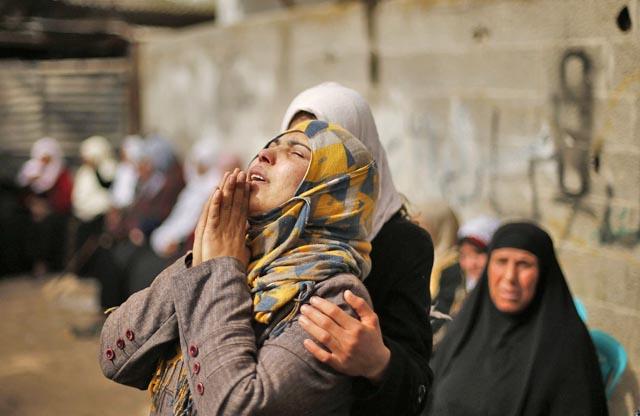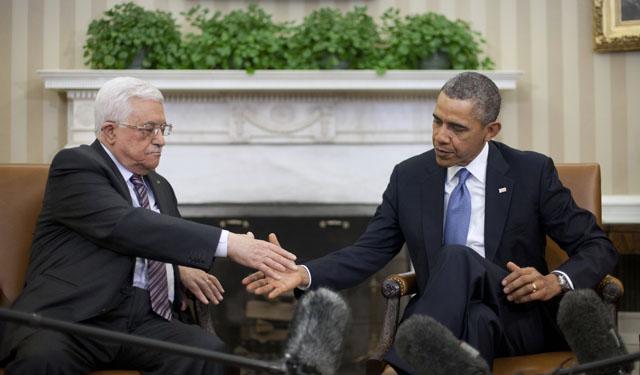You are here
Israel must make tough choices, Obama warns PM
By AFP - Mar 04,2014 - Last updated at Mar 04,2014

WASHINGTON/ RAMALLAH — Israel needs to take tough decisions if peace talks with the Palestinians are to have a future, US President Barack Obama told Prime Minister Benjamin Netanyahu on Monday.
In a joint address at the White House as a major snowstorm blanketed the city, the two leaders, who have struggled to overcome mutual antipathy, once again found themselves very publicly at odds.
Obama pushed for a decision on the peace process, while Netanyahu insisted Israel had done its part and said Iran is now the most urgent threat.
Israel and the Palestinians have been engaged in seven months of direct peace talks which are due to expire at the end of April.
“The time frame that we have set up for completing these negotiations is coming near and some tough decisions are going to have to be made,” Obama said.
“It’s my belief that ultimately it is still possible to create two states. But it’s difficult and it requires compromise on all sides.”
But the Israeli leader hit back, telling the president that Israel had taken “unprecedented steps” to advance peace over the last 20 years, and that the ball was now firmly in the Palestinians’ court.
“Israel has been doing its part, I regret to say the Palestinians haven’t,” he said, noting that in the past two decades, Israel had both frozen settlement construction, uprooted entire settlements and released hundreds of Palestinian “terrorists”.
Netanyahu quickly moved to declare Iran as the number one priority.
“The greatest challenge, undoubtedly, is to prevent Iran from acquiring the capacity to make nuclear weapons,” he told Obama, leaning forward in his chair and gesticulating to make the point.
Although his tone was courteous, Netanyahu’s remarks, particularly on the peace process, came across as a lecture to Obama on recent Israeli history.
The US leader looked on impassively, nodding almost imperceptibly at several points, resting his clenched jaw on his hand.
While Obama’s remarks were mostly general, listing the topics the two men would discuss, Netanyahu narrowed in on Israeli grievances over Iran’s disputed nuclear programme and the perceived raw deal over the peace process.
In their meeting, which lasted at least two hours, Obama was to push Netanyahu to agree to a framework for future talks put together by US Secretary of State John Kerry to extend the negotiations beyond April.
Unconfirmed reports suggest Washington may demand a partial settlement freeze to try and ensure the Palestinians remain at the negotiating table.
It would be Obama’s most significant entry into peacemaking since 2010 when his first attempt at Middle East mediation collapsed after just three weeks in a bitter dispute over settlements.
The as-yet-unpublished framework, which addresses the most nettlesome issues of the conflict — borders, security and the future status of Jerusalem — was central to Netanyahu’s morning meeting with Kerry, a senior Israeli official said.
Analysts say Netanyahu was leaning towards accepting the framework, but so far the Palestinians have rejected any attempt to extend the deadline, denouncing Kerry’s ideas as biased in Israel’s favour and unworkable.
Ahead of their meeting, Netanyahu vowed he would “insist on Israel’s vital interests” and withstand pressure.
But Obama also made clear he meant business in a sharply worded interview published Sunday in which he warned that “continued aggressive settlement construction” would expose Israel to further international isolation.
“We have seen more aggressive settlement construction over the last couple years than we’ve seen in a very long time,” he added in remarks which were borne out by figures published Monday which showed construction starts in West Bank settlements were up 123.7 per cent in 2013.
Settlement construction
Palestinian President Mahmoud Abbas will not extend peace talks with Israel beyond April without further prisoner releases and a halt to settlement construction, Israeli and Palestinian sources said Tuesday.
“We cannot continue negotiations with ongoing settlement construction,” Mohammad Al Madani, a member of the Fateh central committee, quoted the Palestinian president as saying during a meeting with a left-wing Israeli politician.
Abbas met Zehava Galon, head of the Meretz Party, in his Ramallah headquarters on Monday.
A statement from Galon’s office said that in addition to a settlement freeze, Abbas would also demand a release of “further prisoners beyond the next tranche, including women, youths and administrative detainees”.
Israel committed in July to releasing 104 Palestinian prisoners in four tranches. It has so far released 78 of those in three batches.
Abbas also told Galon that “if the American framework agreement will not sufficiently address the fundamental principles of the core issues, we won’t enable extending the negotiations,” according to the statement.
Core issues in the talks include borders, security, Jerusalem and the fate of Palestinian refugees.
The Abbas-Galon meeting took place just before Obama met Israeli Prime Minister Benjamin Netanyahu in Washington.
Unconfirmed reports suggest Washington may demand a partial settlement freeze to try and ensure the Palestinians remain at the negotiating table.
But such demands have not been put to the Israeli side yet, according to Strategic Affairs Minister Yuval Steinitz.
“I think these things are not even on the agenda,” he told public radio, in response to a question about Palestinian demands to freeze settlement construction and release further prisoners.
Pro-settlement Housing Minister Uri Ariel, of the far-right Jewish Home party, said he was not “concerned” by the idea of a settlement freeze, pointing out that “the prime minister has announced there wouldn’t be one”.
Related Articles
US Secretary of State John Kerry and Palestinian President Mahmoud Abbas held “constructive” talks on the Middle East peace process, a US official said Thursday, as crunch decisions loom in the coming days.
RAMALLAH — After a pair of diplomatic victories, the Palestinians are now setting their sights on a Mideast peace conference in France this
US President Barack Obama on Monday told Palestinian leader Mahmoud Abbas that both he and Israeli leaders must make tough political decisions and take “risks” for peace.

















